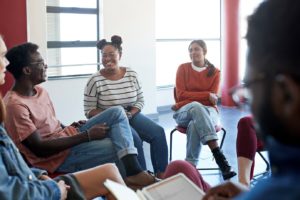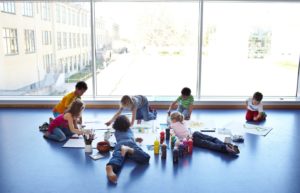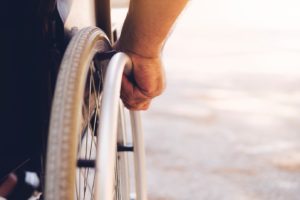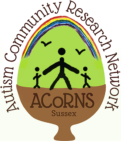This month we had another great autism reading group; this time turning to the fascinating topic of belonging. For advance preparation we had two articles about the autistic community and peer support and an inspirational TED talk about the power of friendship.
Peer support
We started by talking about the benefits of peer-to-peer support to help young people find a sense of belonging. We discussed how current research shows how beneficial this can be and were interested to see how these findings could be generalised. Additionally, some interesting questions were raised. Firstly, where is the balance between having autistic–autistic peer support and finding a sense of belonging with neurotypical people too? That can be useful for both sides to understand more about the other. Spending time in an autistic-only community has huge benefits but can also be a ‘bubble’ that makes it hard to go beyond the bubble. But autistic-autistic peer support schemes can also be beneficial in raising awareness and reducing stigma in the community by being in place, as it brings up those important conversations. Education and greater understanding about neurodivergence, especially in schools is needed 365 days a year, not just during autism awareness week.
 We discussed how joint interests and activities can be a really good way for people to connect. Expecting people just to sit and talk is often not very effective. We can’t expect two autistic people to get on automatically: similar interests can help. All autistic people are different and won’t always get on just because they have the same diagnosis.
We discussed how joint interests and activities can be a really good way for people to connect. Expecting people just to sit and talk is often not very effective. We can’t expect two autistic people to get on automatically: similar interests can help. All autistic people are different and won’t always get on just because they have the same diagnosis.
Some great local examples such as that of MASCOT (Managing Autism Spectrum Condition Ourselves Together), which runs youth clubs autistic children. Having a shared activity and interest creates a welcoming community where individuals feel included and feel like they belong. They also run schemes such as their MASCOT Monday café, which provides young people with work experience and is an inclusive place for them to learn and meet other people. This is great for the city, but we felt there is often a big gap in provision in more rural areas.
What do belonging and friendship look like?
We pondered the differences between these concepts: they will not look the same for everyone. Belonging, as raised in the TED talk, can be about seeing yourself in someone else – but also about how people see us, as this builds our identities. With friendships, there are traditional social constructs of what a friendship should look like, but it can mean different things for different people. For some autistic children, they are happy just to play alongside another child and this is okay. Developmental psychology often suggests linear ‘correct’ stages of friendship development, but this can be very different in autism. We need much more longitudinal research in autism to understand how friendships differ and change over time in ways that are not ‘typical’.
raised in the TED talk, can be about seeing yourself in someone else – but also about how people see us, as this builds our identities. With friendships, there are traditional social constructs of what a friendship should look like, but it can mean different things for different people. For some autistic children, they are happy just to play alongside another child and this is okay. Developmental psychology often suggests linear ‘correct’ stages of friendship development, but this can be very different in autism. We need much more longitudinal research in autism to understand how friendships differ and change over time in ways that are not ‘typical’.
The power of a physical indicator of disability
 We then moved on to an insightful conversation about the power of a physical indication of disability. One member shared a great story about how differently people responded when she took her (able-bodied) autistic son out in a wheelchair, compared to responses when he was walking around. When he was in a wheelchair, people were more understanding, would move out the way willingly and offer help – drastically different to the judgement and lack of help when he was not in a chair. It was remarkable how much a difference it made. For a physical disability, there is often a clear way for strangers to offer some support but for neurodivergent people with no physical impairments, it is harder for people to know how they could help.
We then moved on to an insightful conversation about the power of a physical indication of disability. One member shared a great story about how differently people responded when she took her (able-bodied) autistic son out in a wheelchair, compared to responses when he was walking around. When he was in a wheelchair, people were more understanding, would move out the way willingly and offer help – drastically different to the judgement and lack of help when he was not in a chair. It was remarkable how much a difference it made. For a physical disability, there is often a clear way for strangers to offer some support but for neurodivergent people with no physical impairments, it is harder for people to know how they could help.
The sunflower lanyard is one visible approach to signal a general need for support but since Covid-19, it seems that many people see it as a sign of someone who can’t wear a mask, meaning that the idea of signaling a ‘hidden disability’ of any sort has been lost. What are the next steps to help ensure those with hidden disabilities get the same support? More education and more awareness perhaps.
How can a sense of belonging help reduce suicide?
A group member shared recent work she had done on autism and suicide: suicide rates can be higher in this group. There can be an underlying issue about lacking a feeling of belonging. That can make people feel they need to camouflage their true selves. This leads to what she termed ‘thwarted belonging’ the impossibility of feeling accepted as your true self. This is associated with higher risk of depression and suicide, as in this research by Sarah Cassidy. We spoke about just how much social pressure there is to fit in especially for young people. It highlights just how important it is for everyone to work together to help people find their true sense of belonging – this is bidirectional and isn’t just about autistic people, neurotypical people need to find their sense of belonging with autistic people too and not expect them to change.
this group. There can be an underlying issue about lacking a feeling of belonging. That can make people feel they need to camouflage their true selves. This leads to what she termed ‘thwarted belonging’ the impossibility of feeling accepted as your true self. This is associated with higher risk of depression and suicide, as in this research by Sarah Cassidy. We spoke about just how much social pressure there is to fit in especially for young people. It highlights just how important it is for everyone to work together to help people find their true sense of belonging – this is bidirectional and isn’t just about autistic people, neurotypical people need to find their sense of belonging with autistic people too and not expect them to change.
Other Links:
- Autistica Webinar: Autistic social belonging and connectedness in uncertain times – YouTube
- What Being Autistic Taught Me About Being Human | Daniel Wendler | TEDxBend – YouTube
- An interesting article about autistic peer-peer support
- And a great article about the connectedness of the autistic community
Found this interesting? Want to join our next meeting? Email: acorns@sussex.ac.uk to join the mailing list.

Pingback: Monthly Autism Reading Group - Autism and Gender Identity - May 2022 - ACoRNS Sussex
Pingback: Monthly Autism Reading Group (June 2022)- Autistic Voice - ACoRNS Sussex